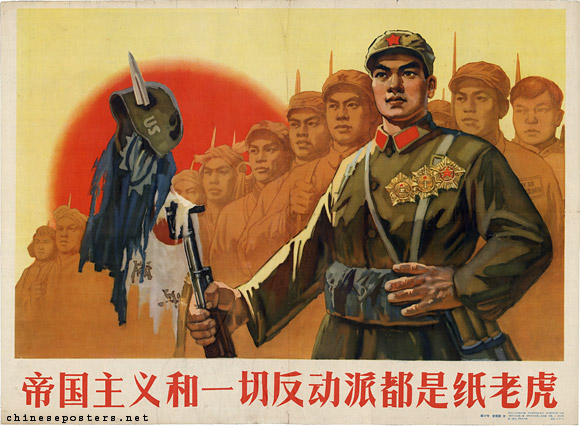 |
| |
   
China and the USA
|
|
Summary
Before 1970, China's relations with the USA were rock-bottom
– for the Chinese Communists, America embodied
capitalism and imperialism.
After 1970, however, as China's relations with the USSR continued
strained, relations with the United States (to the surprise of the world)
improved.
|
Links:
The following websites will help you complete the task:
Chinese-US relations:• Basic account
• Wikipedia
• Timeline
• Chinese posters
|
|
Why China’s relations with the USA were poor |
|
a.
Taiwan
|
|
After the communist victory in 1949, the US continued to say that Taiwan was the legitimate government of China, and the US fleet protected Taiwan against PRC invasion
|
b.
Korea and Vietnam |
Chinese forces attacked UN/US troops in Korea, and China financed and provided weapons for the North Vietnamese |
c.
Foreign Claims Commission, 1967 |
The US set up a claims commission, which (unsuccessfully) demanded restitution for assets seized in 1949 of companies such as Esso and American Express |
d.
The Third Front |
Convinced that the US intended to invade China, the Chinese built a huge network of fortifications, capable of surviving a nuclear attack, in central China |
e.
Anti-American propaganda |
Mao mocked the Americans as ‘paper tigers’, and Chinese schoolchildren every day chanted ‘Death to the American imperialists and their running dogs’ |
| |
Why did relations with the USA improve after 1970? |
a.
Sino-Soviet Confrontation, 1969 |
In 1969 there were a series of Sino-Soviet border clashes; China and the USSR reoriented their nuclear missiles at each other – the USSR, not the USA, became China’s greatest threat |
b.
Lin Biao Plot, 1971 |
In 1971, Lin Biao’s assassination plot had a profound effect on Mao, who ended the Cultural Revolution – this made detente possible |
c.
Stagflation in the USA |
Economic problems in the USA (a combination of high inflation and economic stagnation) meant that the USA no longer had unlimited resources to fight communism all over the world – it was necessary to try detente |
d.
US defeat in Vietnam |
The US problems in Vietnam convinced Nixon that he had to abandon the war there – reconciliation with China, North Vietnam’s greatest ally, would help |
e.
United Nations, 1971 |
Seeking detente with China, the US changed its policy and the PRC became the official representative of ‘China’ at the UN; this paved the way to detente between the USA and China |
| |
Closer relations with the USA from 1970 |
a.
Ping-pong diplomacy, 1971 |
After a chance meeting of two competitors at the table tennis championships in Japan, an American table tennis team went to China; other symbolic gestures followed (e.g. the Chinese sent pandas to London zoo) |
b.
Nixon visit, Feb 1972 |
In February 1972, Present Nixon spent a week visiting China |
c.
Shanghai Communique, 28 Feb 1972 |
The Chinese and US governments promised not to seek hegemony in the Pacific, and to work towards the ‘normalisation’ of relations |
d.
Joint Communique, 1979 |
This marked the formal establishment of diplomatic relations between the two countries |
e.
Strategic Economic Dialogue, 2006 |
By 2006, China was a trade and military superpower, and the Strategic Economic Dialogue talks meet regularly to discuss relations |
| |
|
|
|
Task
Study this poster (it will help you answer question 1 if you google: Imperialism and all reactionaries are all paper tigers), and write answers to the questions which follow:
Government poster, 1965

The text reads: 'Imperialism and all reactionaries are all paper tigers'.
Explain the meaning of the poster.
Why were Chinese-US relations so poor in
1965?.
Describe how and why relations between China and the United States improved after 1970.
|